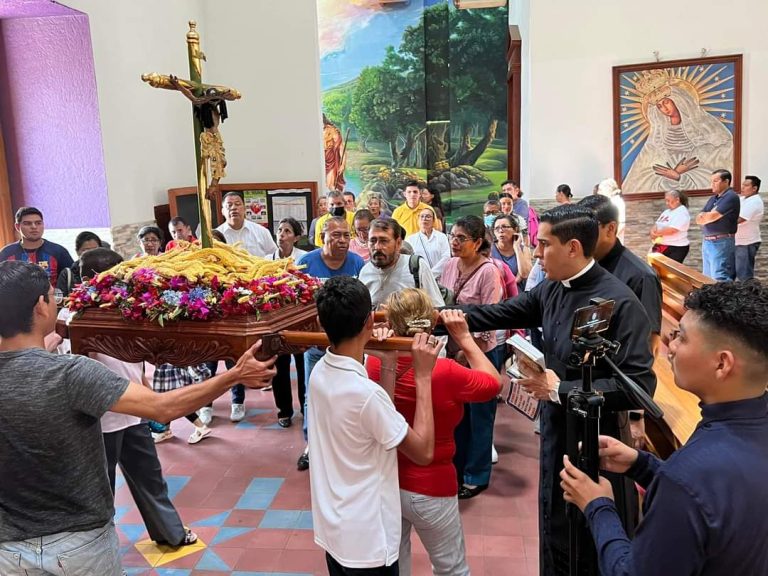26 de marzo 2024

Children of Exile: The Births “Sowing Hope” in the Camp of Nicaraguan Farmers

PUBLICIDAD 1M
PUBLICIDAD 4D
PUBLICIDAD 5D
The Ortega-Murillo dictatorship has banned 4,800 processions during Lent and approaching Holy Week, according to attorney Martha Patricia Molina

Parishioners participate in the Friday of the Cross procession in the Managua Cathedral // Photo: Taken from social networks.
Eva, a 55-year-old parishioner of a Managua church, says she has experienced her worst Lenten Fridays in 2024, being watched by the inquisitive eyes of uniformed and plainclothes police. "Those people take your peace away," she says.
The devout Catholic says she has felt "uncomfortable" with the presence of the police, who during the past four Fridays of Lent have been stationed at the main gates of her church to watch over the entering and exiting of the parishioners.
Eva claims that police presence has increased since Ash Wednesday, commemorated on February 14. "They [the police] are coming more often. I don't know what they're looking for. We only come to participate in mass and pray our rosaries like any believer," she says.
Police harassment during the Stations of the Cross on Fridays during Lent is being experienced in almost all churches in Nicaragua. Several parishioners confirmed to CONFIDENCIAL the presence of uniformed police and others in civilian clothes, who walk around outside, and sometimes inside, the churches to verify –so they say– that everything is in "order."
Police surveillance is one of the many measures that the Ortega-Murillo dictatorship is carrying out against the Nicaraguan Catholic Church. Since the citizen protests of April 2018, the regime has insulted, imprisoned and banished bishops and priests, confiscated their properties and frozen their bank accounts.
"Every time I come to the Stations of the Cross, the police are at the entrance keeping watch. And when we are praying or at mass, people in civilian clothes come to film and take pictures of us," says Eva.
The dictatorship has banned some 4,800 processions during Lent and Holy Week, including "processions that were to take place on the four Fridays of Lent, Palm Sunday and those that will take place during Holy Week itself," says lawyer Martha Patricia Molina, who has investigated and systematized the aggressions against the Church in Nicaragua.
"Many parishes are not carrying out [neither outside nor inside the churches] the number of Holy Week processions they usually do. They have chosen to carry out other religious activities such as praying the Rosary or doing a vigil," according to Molina, the author of the study "Nicaragua: A persecuted Church?"
Molina explained that some churches have been allowed to hold processions outside the temples, but in others, at the "last minute," a police agent appears "with a counter-order saying they can't go outside, under threat of being imprisoned."
A collaborator of a church in Managua told CONFIDENCIAL that police agents came to the parish offices to ask for the program schedule for the Fridays of Lent and Holy Week. "Since the beginning of the year [2024], they have been asking for the program. They want all the details of the dates, times, activities. We give it to them and they leave," he added.
Ortega's attacks have not been limited to churches. A group of lay people, traveling from Leon, was prevented from reaching the National Shrine of Jesus del Rescate, in Popoyuapa, Rivas, on Saturday, March 16.
The Leon residents organized themselves to make the pilgrimage in three 18-passenger vans. They were stopped at more than six police checkpoints along the way, where they were threatened with jail "if they arrived at their destination."
"Every year we go to the Shrine. That Saturday, we were stopped at several checkpoints on the way. They asked the driver where we were going and when he told them we were going to Popoyuapa, they told him that there was nothing there, but they let us continue on," said one of the members of the group.
When they got to the town of Rivas, they were stopped at a last checkpoint where they were warned that it was better to turn back. "Ours wasn't the only group going. There were caravans of buses from all over the country carrying penitents. At the last checkpoint they told us that we could not keep going, and that if we continued [to the shrine], we could get into trouble. To not take the risk, we went somewhere else," the member of the Leon group explained.
This article was published in Spanish in Confidencial and translated by our staff. To get the most relevant news from our English coverage delivered straight to your inbox, subscribe to The Dispatch.
PUBLICIDAD 3M
Confidencial es un diario digital nicaragüense, de formato multimedia, fundado por Carlos F. Chamorro en junio de 1996. Inició como un semanario impreso y hoy es un medio de referencia regional con información, análisis, entrevistas, perfiles, reportajes e investigaciones sobre Nicaragua, informando desde el exilio por la persecución política de la dictadura de Daniel Ortega y Rosario Murillo.
PUBLICIDAD 3D